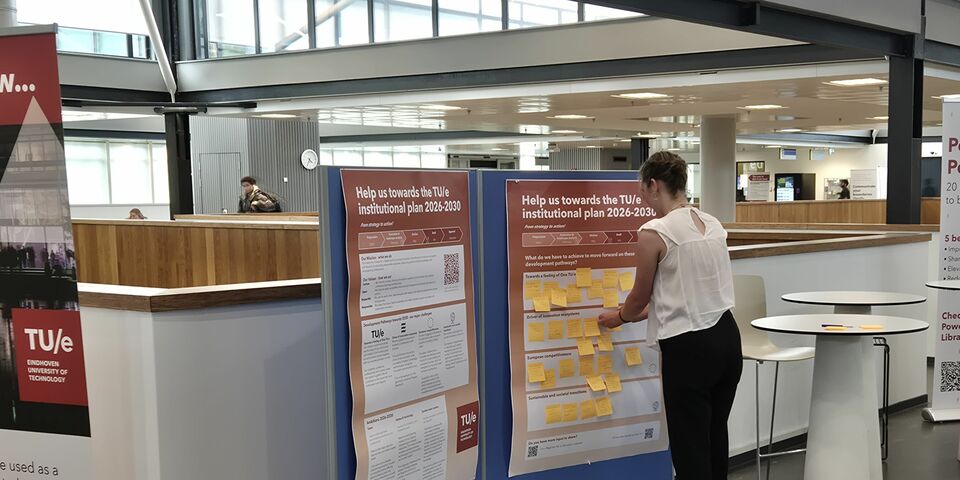TU/e starts discussions on draft institutional plan
TU/e is working on a document that will serve as the guiding thread for its policy over the next five years. This new institutional plan is now 50% complete, and the draft version is being discussed with staff in four sessions. On Tuesday morning, a handful of participants gathered for the first session.
In one of the last rooms in Gemini-Zuid that still has furniture, policy officer Renee Westenbrink leads the first meeting where employees can provide input on the university’s policy statements. He explains that, compared to the previous Institutional Plan, this version places TU/e’s core values and mission front and center and sets only three priorities. In 2020, TU/e outlined seventeen policy priorities in its previous institutional plan.
Three priorities
TU/e wants to train responsible engineers and world-leading academics, conduct research to support transitions and competitive strength, and create societal value through technological innovation. Board president Koen Janssen explains the university’s biggest challenges for the next five years.
“We’re working towards ‘One TU/e’. This means that everyone is equal, from cleaners to professors, and that there’s a sense of unity. But diversity is paramount; uniformity has no place at TU/e. We have nine different departments, each with its own way of working. We’re going to harmonize where possible and differentiate where necessary,” says Janssen.
Transitions
A second development is the transition to a sustainable and socially responsible society. Janssen points to TU/e’s strong ties with companies in the Brainport region and expresses his appreciation for the public funds available each year. That is why we, as a university, have to give something back to society; so we’re going to contribute to transitions in energy, health, and digitalization.”
The third focus point is contributing to Europe’s competitive strength. “There’s political tension around the world – even in the Netherlands.” Janssen is referring to the cabinet’s collapse this morning. He fears that all the work done in recent months to discuss the proposed cuts with the government will have to be repeated. “In any case, we need to strengthen our ties with other universities. The EuroTech Universities Alliance is a good example of this.”
Solidarity
Westenbrink asks the participants what “One TU/e” means to them. An APSE employee brings up the topic of solidarity between departments. “I work at one of the four departments that receive Beethoven funding. The fact that the other departments do not receive this funding creates tension. I think that needs to be addressed.” Board president Janssen responds that all departments and services are needed to develop chips and that acknowledging the tension is an important step.
As input on the sustainable and social transition, Bart Jansen, an employee at Computer Science and board member of TU/e Young Academy of Engineering, points out that health has always been and will always be important, but is not currently undergoing a transition, like the energy supply is. “The goal of digitalization has already been achieved; we live in a society where everything is stored digitally. The real challenge lies in using Artificial Intelligence appropriately to handle the available data.”
Koen Janssen responds that healthcare is most certainly undergoing changes. “Think of staff shortages, dependence on big pharma, and the rise of all kinds of health-focused start-ups.” The computer scientist acknowledges this, and the joint conclusion is that terms like ‘transition’ in the document warrant further review.
Preparedness
Bart Jansen offers further feedback on the draft institutional plan. “There’s a conflict between the transparency that TU/e strives for and the ‘preparedness’ that is not further explained. Could the desired openness be a reason not to conduct defense-related research?” It’s a valid question that cannot be answered at this time. But Westenbrink thanks him for the input; “We’ll look into this further. We aim to be as open as possible and as closed as necessary.”
Humeyra Caglayan, associate professor at EE, concludes by asking how TU/e will tackle these major challenges. “First, we will gather more input during three additional sessions, which will provide us with a clearer idea of what needs to be done,” says Westenbrink.
Finally, Koen Janssen thanks all participants for their contributions and invites them to continue the discussion if they wish. “You’re welcome to call or email anytime.” TU/e hopes to complete its Institutional Plan 2026-2030 in December.


Discussion